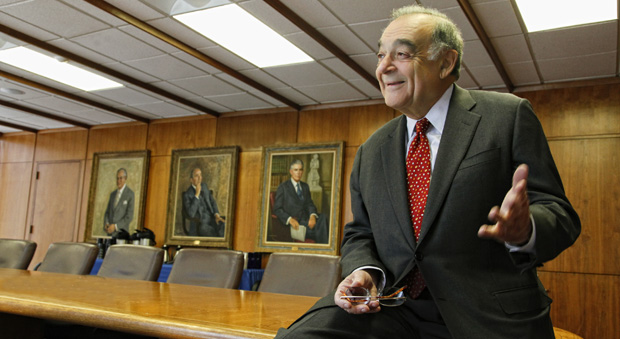Mal Sherman finishes term as board chair, stays on at Brandeis
Decades of service rooted in family connections, uniqueness of the place
 Photo/Mike Lovett
Photo/Mike LovettMalcolm L. Sherman – “Mal” to hundreds of Brandeis professors, students and staff who have known him during his 33 years on the university’s Board of Trustees – has brought strong leadership to a long list of for-profit and nonprofit organizations, from the giant retailer Zayre Stores to Tufts Medical Center to the Museum of Science.
But nowhere has his commitment been as long or as deep as at Brandeis, where he is the second-longest-serving current board member. Sherman, who stepped down as board chair May 19, helped the university through some of the greatest challenges in its history.
He played a major role in guiding Brandeis through the 2008 economic downturn that challenged higher-education endowments, developing new budget planning models that have put the university on a firm footing for the future. His tenure leading the board coincided with a number of challenges for Brandeis. He oversaw the selection of a new president and the transition to a new administration, then helped President Fred Lawrence review and re-structure the governance of the board itself.
The reasons for his attachment to Brandeis, Sherman said during a recent interview in his Natick office, are simple.
“This is a great educational institution, unique in this country, probably unique in the world, for its interesting combination of the humanities and science, for its Jewishness, for the fact that it has done so much in such a short period of time,” he said. From the beginning, “it appealed to me because it is rooted in principles I am comfortable with, and because my wife loved the place so much.”
That beginning was a long time ago.
Barbara Cantor Sherman has been involved in class activities ever since she graduated, in 1954. She married Mal in 1958 in a Brandeis chapel, and three or four years later introduced him to founding President Abram L. Sachar at a dinner.
“Abe and I started to talk,” Sherman recalled, “and it was a warm and friendly sort of conversation. He followed up, and out of that grew my involvement with Brandeis.”
Geography and family both helped deepen the relationship.
Sherman grew up in Newton and has lived in Wellesley for the past 46 years. “Living so close, we could be on campus often, and the more time we spent the more we wanted to spend,” he said. His daughter, Robin, graduated from Brandeis in 1983 and serves with her mother on the Board of Fellows. One granddaughter has been bat mitzvah on campus; the other will be in two years.
“Mal has been a crucial partner for me during my first years as President. He has a deep understanding of Brandeis and a profound love for the university. All members of the Brandeis family owe him our thanks for the important role he has played over the past six years as Chair, and all his many years as a Trustee," said President Lawrence.
Sherman delights in the idea that he has twice disproved F. Scott Fitzgerald’s dictum that there are no second acts in American life. Making it big at Zayre – which grew enormously during his reign, first as president, then as CEO – was act one. Turning around a series of troubled companies was act two. Philanthropy is act three.
Generous supporters of the arts at Brandeis, he and his wife have created the Robin, Barbara and Malcolm L. Sherman Endowment for the Performing Arts and the Barbara Sherman ’54 and Malcolm L. Sherman Chair of Theater Arts. Sherman’s broad array of connections also has benefited the university, most recently when his idea for a Brandeis-Museum of Science educational partnership in connection with the current Dead Sea Scrolls exhibition at the museum became a reality, providing educational opportunities for Brandeis students.
Just as important, perhaps, he has been on the cutting edge of a landmark change in the nonprofit world sometimes called “venture philanthropy.”
“Most guys of his generation gave because it felt good” and it was expected, says David Mersky, an expert on philanthropic giving and development who lectures on Jewish philanthropy and fundraising in the Hornstein Jewish Professional Leadership Program.
Sherman and philanthropists Morton Mandel and Charles Bronfman were among the first who “looked at nonprofits like businesses, and wanted a return on investment, even though the return wasn’t going to be money,” Mersky said. “They want to see that the investment advances the mission.”
That approach now is widespread among major donors and nonprofit leaders, but Sherman was one of a small group that was decades ahead of the trend.
“Savvy is how I would describe him,” says Dean Bruce Magid of the International Business School, whom Sherman was instrumental in recruiting to Brandeis. “He is not only savvy in business, he is an excellent judge of character and has a certain tenacity.”
“Mal is a closer,” said Magid, who is the Martin and Ahuva Gross Chair in Financial Markets and Institutions. “He does not pontificate. He is a deep thinker who can remove the clutter. And he is fun to be with. He knows just about everyone.”
President emeritus Jehuda Reinharz, PhD'72 applauded Sherman’s businesslike approach, his sense of humor and his firm grip on the proper role of the chairman of the board.
“Mal advised, he helped guide, but he didn’t try to run the university,” Reinharz said. “I liked that he has a sense of humor. Somebody has a sense of humor, you can always resolve things.”
Categories: General





